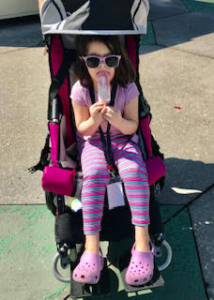

Alyssa Kimball’s family of five has a lot on their plate.
Of the three children, ages 6 through 9, the youngest has autism plus a handful of medical issues, the middle child has been diagnosed with ADHD, and the oldest doesn’t currently have a diagnosis, but is suspected to have autism and/or ADHD.
And along with the children’s healthcare needs, Alyssa is also learning about and coping with her own conditions, which include diagnoses of POTS (postural orthostatic tachycardia), dysautonomia, MCAS (mast cell activation syndrome), SFN (Small fiber neuropathy, & EDS (Ehlers-Danlos Syndrome).
Because of all the work that managing these conditions and care coordination can take – which many in our community know can amount to a full-time job – Alyssa currently isn’t able to work outside the home, meaning her husband’s job is the sole source of income for the family.
But through a community of support that Alyssa has been able to tap into, she has hope that things can get better.
The Kimball family was recently accepted into CNF’s Digital Access program, which provides eligible families with a free Chromebook to keep and a Wi-Fi hotspot for one year. Alyssa heard of this program through a local online support group where she lives in New Hampshire and knew that this could be a game changer for her family because of how important telehealth has become for them.
“The conditions that my daughter and I are dealing with are rare,” Alyssa said. “So, we’re having to speak with specialists who are in different areas of the country. And because of my small fiber neuropathy, I’m not able to drive for more than a few hours at a time. So even aside from concerns of the pandemic, telehealth has been a really important tool for us.”
Even after the pandemic, there are some appointments that Alyssa prefers to keep online. For example, she realized her daughter does better with virtual speech therapy because there is less around to distract her than there would be in a clinical setting.
But the family doesn’t currently have a computer, and they’ve been using Alyssa’s phone for a lot of the telehealth appointments, tools, and research, which isn’t ideal.
“The Chromebook will be so helpful for us,” she continued. “Beyond the immediate appointments, I’m also aware of the fact that all three of my kids have a 50-60% chance of having 1 or more of the conditions that I have. So, the more I can educate myself on my diagnoses, the more I can help prevent the severity of the disease in them. I wasn’t receiving the care I needed as a child, so my goal as a parent is to provide them with what they need to be okay and thrive.”
CNF’s mission is to help all children reach their full potential. If the Digital Access Program can help your family or someone you know, we encourage you to apply. The program is running while supplies last, so don’t wait.

